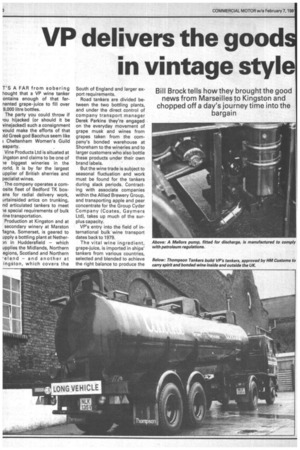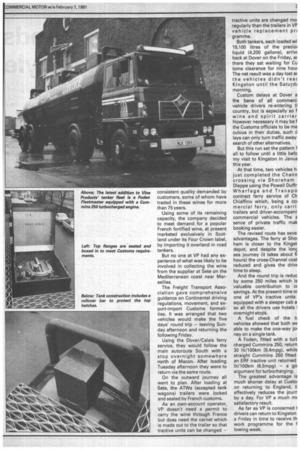VP delivers the good in vintage style
Page 38

Page 39

If you've noticed an error in this article please click here to report it so we can fix it.
Bill Brock tells how they brought the good news from Marseilles to Kingston and chopped off a day's journey time into the bargain
T'S A FAR from sobering hought that a VP wine tanker ontains enough of that fernented grape-juice to fill over 9,000 litre bottles.
The party you could throw if fou hijacked (or should it be vinejacked) such a consignment vould make the efforts of that )Id Greek god Bacchus seem like I Cheltenham Women's Guild eaparty.
Vine Products Ltd is situated at ingston and claims to be one of le biggest wineries in the /odd. It is by far the largest upplier of British sherries and pecialist wines.
The company operates a cornosite fleet of Bedford TK boxans for radial delivery work, urtainsided artics on trunking, rid articulated tankers to meet le special requirements of bulk tine transportation.
Production at Kingston and at secondary winery at Marston lagna, Somerset, is geared to apply a bottling plant at Nether)11 in Huddersfield — which applies the Midlands, Northern egions, Scotland and Northern • eland — and another at ingston, which covers the South of England and larger export requirements.
Road tankers are divided between the two bottling plants, and under the direct control of company transport manager Derek Parkins they're engaged on the everyday movement of grape musk and wines from grapes taken from the company's bonded warehouse at Shoreham to the wineries and to larger customers who also bottle these products under their own brand labels.
But the wine trade is subject to seasonal fluctuation and work must be found for the tankers during slack periods. Contracting with associate companies within the Allied Brewery Group, and transporting apple and pear concentrate for the Group Cyder Company (Coates, Gaymers Ltd), takes up much of the surplus capacity.
VP's entry into the field of international bulk ' wine transport dates back to 1979.
The vital wine ingredient, grape-juice, is imported in ships' tankers from various countries, selected and blended to achieve the right balance to produce the consistent quality demanded by customers, some of whom have traded in these wines for more than 75 years.
Using some of its remaining capacity, the company decided to meet demand for a popular French fortified wine, at present marketed exclusively in Scotland under its Four Crown label, by importing it overland in road tankers.
But no one at VP had any experience of what was likely to be involved in collecting the wine from the supplier at Sete on the Mediterranean coast near Marseilles.
The Freight Transport Association gave comprehensive guidance on Continental driving regulations, movement, and export-import Customs formalities. It was arranged that two vehicles would make the five days' round trip — leaving Sunday afternoon and returning the following Friday.
Using the Dover/Calais ferry service, they would follow the main autoroute South with a stop overnight somewhere north of Macon. After loading Tuesday afternoon they were to return via the same route.
On the outward journey all went to plan. After loading at Sete, the ATWs (accepted tank wagons) trailers were locked and sealed by French customs.
As an own-account operator, VP doesn't need a permit to carry the wine through France but does need the carnet which is made out to the trailer so that tractive units can be changed — tractive units are changed mo regularly than the trailers in VP vehicle replacement pri gramme.
Both tankers, each loaded wi 19,100 litres of the precioi liquid (4,200 gallons), arriv( back at Dover on the Friday, at there they sat waiting for Cu toms clearance for nine how The net result was a day lost at the vehicles didn't reac Kingston until the Saturdi morning.
Custom delays at Dover a the bane of all commerci vehicle drivers re-entering ti country, but is especially so f wine and spirit carrier However necessary it may be f the Customs officials to be me culous in their duties, such d lays can only turn traffic away search of other alternatives.
But this run set the pattern f all to follow until a little befa my visit to Kingston in Janua this year.
At that time, two vehicles h, just completed the Chann crossing via Shoreham Dieppe using the Powell Duffr Wharfage and Transpo contract ferry service of Ch Chiaffino which, being a col mercial ferry, only carri trailers and driver-accompani commercial vehicles. The a sence of private traffic mak booking easier.
The revised route has seve advantages. The ferry at Shoi ham is closer to the Kingst, depot, and despite the lonc sea journey (it takes about fi hours) the cross-Channel cost reduced and gives the drivE time to sleep.
And the round trip is reduc by some 250 miles which is valuable contribution to c( savings. At the present time or one of VP's tractive units equipped with a sleeper cab a so all the drivers use hotels overnight stops.
A fuel check of the t% vehicles showed that both wE able to make the one-way joi ney on a single tank.
A Foden, fitted with a turt charged Cummins 250, return 30 lit/100km (9,4mpg), while straight Cummins 250 fitted an ERF tractive unit returned lit/100km (6.5mpg) — a go argument for turbocharging.
The greatest advantage is much shorter delay at Custoi on returning to England, tl effectively reduces the jourr by a day. For VP a much mc satisfactory result.
As far as VP is concerned 1 drivers can return to Kingston a Friday in time to receive th work programme for the f lowing week.












































































































